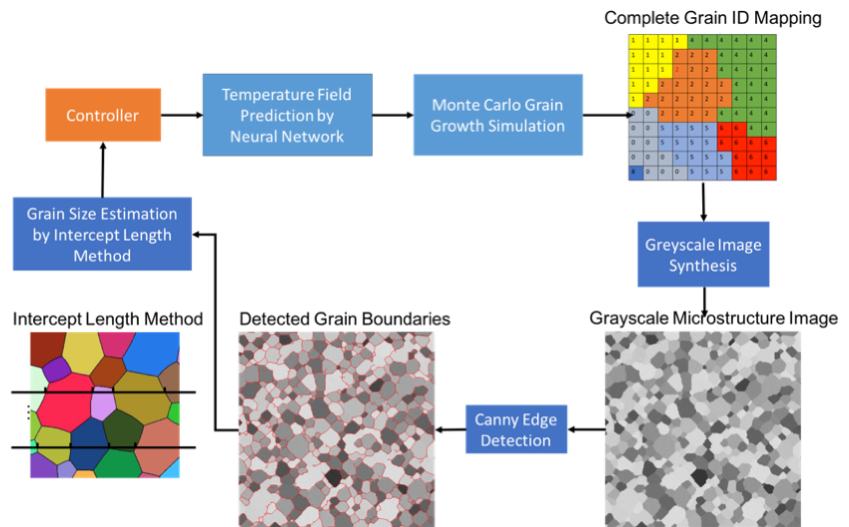This research will develop the understanding and methods necessary to generate and interpret experimental and simulated descriptions of microstructural transformation during thermo-mechanical processing, and then to apply the necessary control of processing conditions to generate a prescribed microstructure in the alloy Ti-6%Al-4%. Real-time scanning electron microscope observations and mechanical property measurements during thermo-mechanical deformation will be coupled to predictive simulations of microstructural evolution. Real-time adjustment of the evolving microstructure will then be enabled through adaptive control of the temperature and strain history using model-based feed-forward control and measurement-based feedback control. Furthermore, through working with an established set of industrial collaborators, this new knowledge will be translated into macro scale applications. The overall intellectual significance of this work is thus the synthesis of experimental characterization, process control, and microstructure simulation to predict, monitor and control microstructural evolution during thermo-mechanical processing, and the scaling of laboratory tests to macro-scale applications. The major broader focus will be on training the next-generation workforce to be skilled in the integrated experiment-simulation-data approach epitomized by the Materials Genome Initiative.
Designing Materials to Revolutionize and Engineer our Future (DMREF), Adaptive Control of Microstructure from the Microscale to the Macroscale
National Science Foundation
Robert Hull
Antoinette Maniatty, John Wen, Dan Lewis
Designing Materials to Revolutionize and Engineer our Future (DMREF), Real Time Control of Grain Growth in Metals
The control of processing conditions, including the temperature and load sequences during manufacturing of materials and parts, is critical to optimize strength and performance. These properties depend in turn upon the detailed internal structure, or microstructure, of the material. Historically, the optimum processing conditions have been determined largely through experience and trial-and-error, requiring long lead times to manufacture and to market. This Designing Materials to Revolutionize and Engineer our Future (DMREF) award supports research focused on establishing the methodologies necessary to substantially shorten these development cycles. This will be achieved by developing new combinations of experimental, computational and process control methods to actively control processing of advanced metals, to achieve the target microstructures that are predicted for optimized performance. Initial implementations will employ custom-built equipment whereby manufacturing conditions can be replicated at the laboratory scale, while imaging at very high magnification how the microstructure of the material evolves. The evolving microstructure will then be compared during processing to computational simulations of the desired microstructure, and adjusted as required using active control technologies. The optimum processing conditions will then be extended to manufacturing conditions working with a set of industrial collaborators. This work will thus develop new methodologies that can be of significant competitive advantage to the US metals manufacturing industry. The set of students engaged in this research will be trained in both the specific techniques and in the overall outlook of applying fundamental materials research to the challenge of accelerating manufacturing development cycles.
This research will develop the understanding and methods necessary to generate and interpret experimental and simulated descriptions of microstructural transformation during thermo-mechanical processing, and then to apply the necessary control of processing conditions to generate a prescribed microstructure in the alloy Ti-6%Al-4%. Real-time scanning electron microscope observations and mechanical property measurements during thermo-mechanical deformation will be coupled to predictive simulations of microstructural evolution. Real-time adjustment of the evolving microstructure will then be enabled through adaptive control of the temperature and strain history using model-based feed-forward control and measurement-based feedback control. Furthermore, through working with an established set of industrial collaborators, this new knowledge will be translated into macro scale applications. The overall intellectual significance of this work is thus the synthesis of experimental characterization, process control, and microstructure simulation to predict, monitor and control microstructural evolution during thermo-mechanical processing, and the scaling of laboratory tests to macro-scale applications. The major broader focus will be on training the next-generation workforce to be skilled in the integrated experiment-simulation-data approach epitomized by the Materials Genome Initiative.





